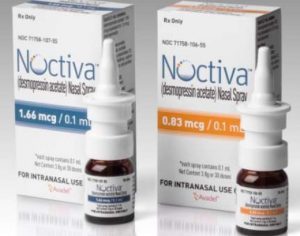- Home
- Editorial
- News
- Practice Guidelines
- Anesthesiology Guidelines
- Cancer Guidelines
- Cardiac Sciences Guidelines
- Critical Care Guidelines
- Dentistry Guidelines
- Dermatology Guidelines
- Diabetes and Endo Guidelines
- Diagnostics Guidelines
- ENT Guidelines
- Featured Practice Guidelines
- Gastroenterology Guidelines
- Geriatrics Guidelines
- Medicine Guidelines
- Nephrology Guidelines
- Neurosciences Guidelines
- Obs and Gynae Guidelines
- Ophthalmology Guidelines
- Orthopaedics Guidelines
- Paediatrics Guidelines
- Psychiatry Guidelines
- Pulmonology Guidelines
- Radiology Guidelines
- Surgery Guidelines
- Urology Guidelines
Desmopressin-Treatment for Nocturnal Polyuria Launched

Noctiva was approved on the basis of findings from two 12-week, randomized, double-blind, placebo-controlled trials (N=1045) in patients with nocturia due to nocturnal polyuria. It contains an emulsified microdose of desmopressin acetate combined with a permeation enhancer that increases the transport of the drug across the nasal mucosa.
Desmopressin, a synthetic analogue of vasopressin, is a selective agonist at V2 receptors on renal cells in the collecting ducts, increasing water re-absorption in the kidneys, and reducing urine production. It is supplied as a nasal spray in two strengths: 0.83mcg/0.1mL and 1.66mcg/0.1mL. Each bottle contains 30 effective doses in addition to the initial priming (5 actuations) which is equal to 30 days of medication when used as one spray once a day.
WARNING: HYPONATREMIA
- NOCTIVA can cause hyponatremia. Severe hyponatremia can be life-threatening, leading to seizures, coma, respiratory arrest, or death.
- NOCTIVA is contraindicated in patients at increased risk of severe hyponatremia, such as patients with excessive fluid intake, illnesses that can cause fluid or electrolyte imbalances, and in those using loop diuretics or systemic or inhaled glucocorticoids.
- Ensure serum sodium concentrations are normal before starting or resuming NOCTIVA. Measure serum sodium within seven days and approximately one month after initiating therapy or increasing the dose, and periodically during treatment. More frequently monitor serum sodium in patients 65 years of age and older and in patients at increased risk of hyponatremia.
- If hyponatremia occurs, NOCTIVA may need to be temporarily or permanently discontinued.

Disclaimer: This site is primarily intended for healthcare professionals. Any content/information on this website does not replace the advice of medical and/or health professionals and should not be construed as medical/diagnostic advice/endorsement or prescription. Use of this site is subject to our terms of use, privacy policy, advertisement policy. © 2020 Minerva Medical Treatment Pvt Ltd